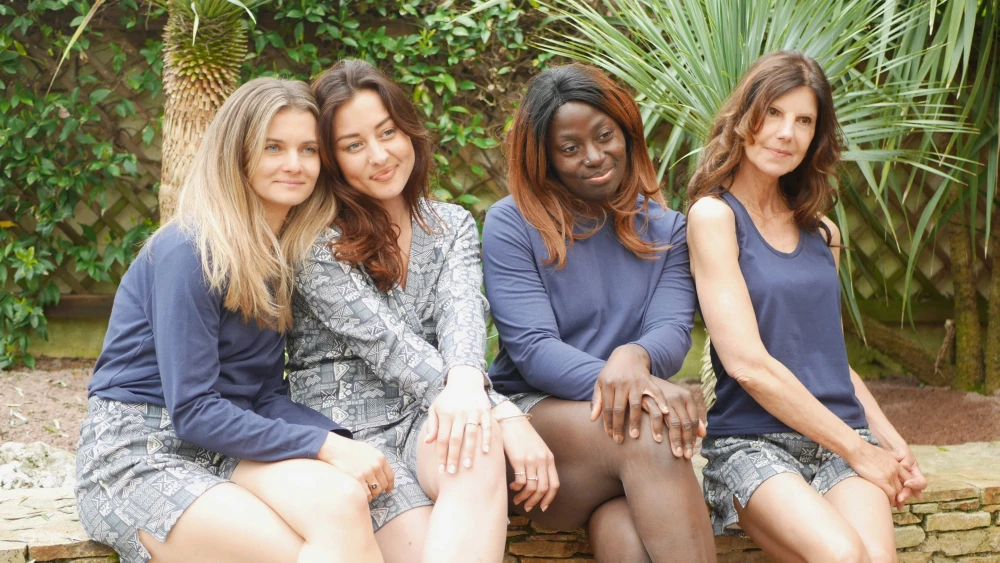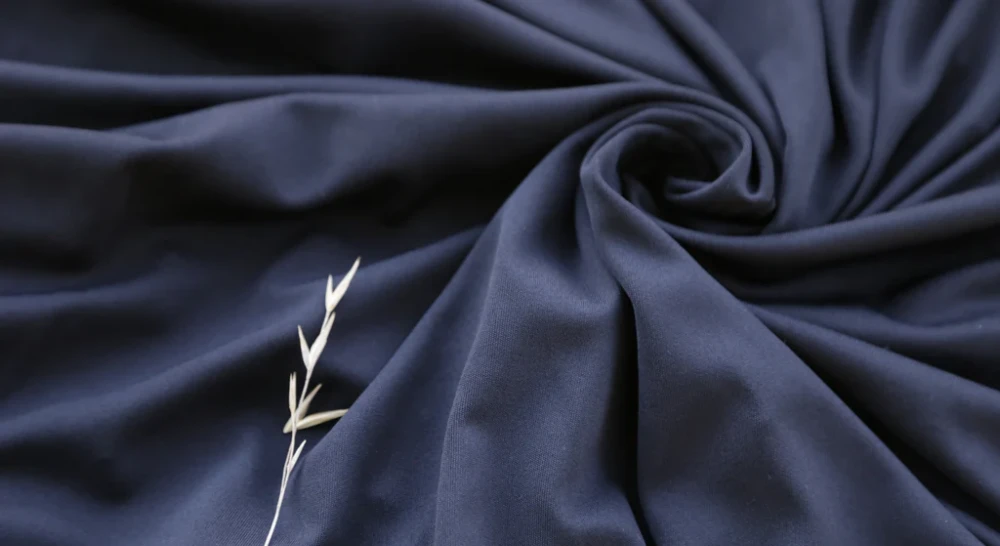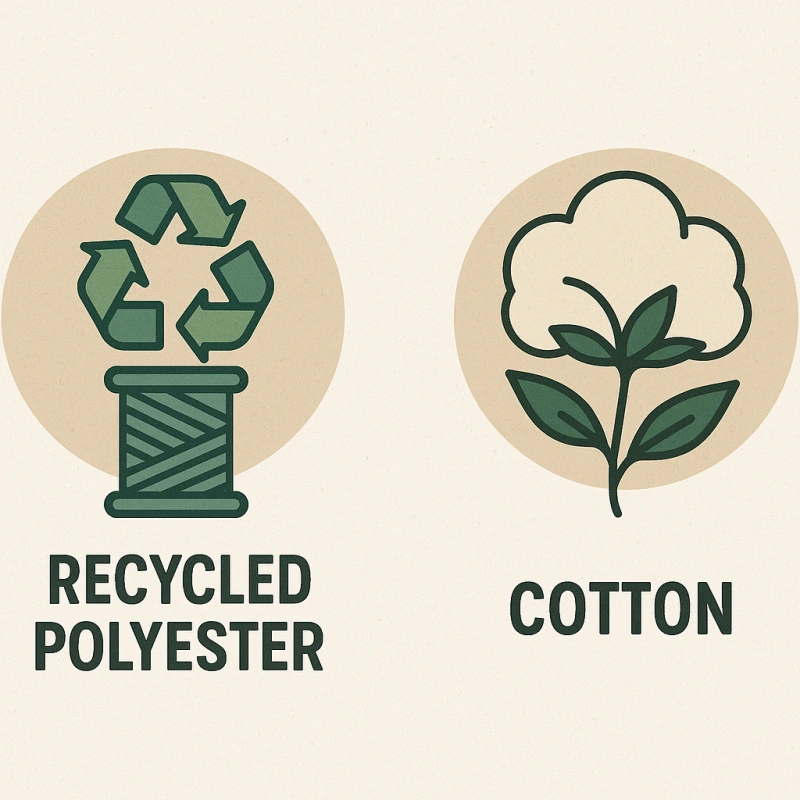As a pajama brand, choosing between recycled polyester and cotton is a crucial decision that directly affects your business goals. The material you select will influence customer satisfaction, shape your brand image, and impact your bottom line. When weighing recycled polyester vs cotton, consider these important factors:
Comfort is essential for sleepwear and plays a major role in building customer loyalty.
Sustainability is increasingly important, with recycled polyester vs cotton becoming a key consideration for eco-conscious consumers and brand partnerships.
Cost and durability matter, as choosing the right fabric can reduce replacements and maximize long-term value.
With Friendtex’s expertise in premium, sustainable manufacturing, you can confidently choose between recycled polyester vs cotton for your next collection, ensuring your brand meets both quality and environmental standards.
Key Takeaways
Comfort is key for pajamas. Choose fabrics that feel good against the skin to build customer loyalty.
Sustainability matters. Consider using recycled polyester or organic cotton to appeal to eco-conscious consumers.
Evaluate cost and durability. Recycled polyester offers lower maintenance costs, while cotton provides natural softness.
Blend fabrics for the best of both worlds. Combining recycled polyester and cotton can enhance comfort and performance.
Partner with a reliable supplier like Friendtex. They offer expertise in sustainable manufacturing and customization options.
Quick Comparison
Key Differences
When you compare recycled polyester and cotton for sleepwear, you notice several important differences. Each fabric brings unique qualities to your pajama line. The table below highlights the main physical and chemical properties that matter most for pajamas:
Property | Recycled Polyester | Cotton |
|---|---|---|
Softness | Comparable comfort due to fabric technology | Known for its softness |
Breathability | Moderate | Excellent, especially in warm climates |
Moisture-wicking | Yes, due to advancements | No |
Quick-drying | Yes | No |
Biodegradability | No | Yes |
Environmental Impact | Derived from post-consumer plastic waste | Requires significant water and pesticides |
You get comfort from both fabrics, but cotton stands out for breathability and softness. Recycled polyester offers moisture-wicking and quick-drying features, which help keep pajamas fresh and easy to care for. Cotton is biodegradable, while recycled polyester supports sustainability by using post-consumer plastic waste.
Tip: If you want pajamas that dry quickly and resist wrinkles, recycled polyester is a strong choice. For brands focused on natural feel and breathability, cotton remains a classic favorite.
Pajama Suitability

Choosing the right fabric for your pajama collection depends on your brand’s priorities. The table below compares how each material performs in key areas for sleepwear:
Fabric Type | Comfort | Breathability | Durability | Maintenance | Environmental Impact |
|---|---|---|---|---|---|
Cotton | Soft, hypoallergenic | High | Moderate | Requires care | Eco-friendly |
Recycled Polyester | Moderate | Lower than cotton | High | Low maintenance | Less eco-friendly |
Cotton pajamas give your customers a soft, hypoallergenic experience with high breathability, making them ideal for warm climates or sensitive skin. Recycled polyester pajamas provide excellent durability and easy maintenance, which reduces replacement costs and keeps your products looking new.
Friendtex offers both options, allowing you to match your brand’s vision with the right fabric for your target market.
Recycled Polyester vs Cotton Overview
What Is Recycled Polyester?

You encounter recycled polyester in many modern pajama collections. This fiber comes from recycled sources such as PET bottles, old polyester clothing, and even discarded fishing nets. The process transforms waste into high-quality fabric for sleepwear.
Here is how recycled polyester is made:
Collection of plastic bottles and other recyclable polyester materials from recycling centers, oceans, and curbside programs.
Sorting and cleaning to remove labels, caps, and contaminants.
Grinding the cleaned material into small flakes or granules.
Melting the granules at high temperatures creates a thick liquid.
Drawing textile fibers from the molten granules.
Knitting or braiding the fibers into fabric.
You see recycled polyester production rising globally, reaching about 9.3 million tonnes in 2024. The fiber now holds a 12% market share in the world’s textile industry.
When you compare recycled polyester vs cotton, you notice recycled polyester offers moisture-wicking, quick-drying, and wrinkle-resistant properties. These features make it a strong choice for sleepwear that needs durability and easy care.
What Is Cotton?
Cotton remains a classic favorite in the polyester vs cotton debate. You recognize cotton for its natural softness and breathability. Pajama brands often choose cotton for its comfort and hypoallergenic qualities.
Cotton comes from the fluffy fibers of the cotton plant. Farmers harvest the bolls, separate the fibers, and spin them into yarn. You find cotton in many sleepwear products because it feels gentle against the skin and allows air to circulate.
Global cotton production is projected to reach 24.5 million tonnes in 2024, accounting for 19% of total world fiber production. Cotton’s natural origin and biodegradability make it popular among eco-conscious consumers.
When you compare recycled polyester vs cotton, cotton stands out for its softness and ability to keep you cool in warm climates.
Friendtex Fabric Options
You want flexibility when choosing fabrics for your pajama brand. Friendtex offers a wide range of options, including recycled polyester and premium cotton.
You can select recycled polyester for its durability, moisture-wicking, and easy maintenance. Friendtex’s recycled polyester pajamas and robes provide comfort and resist wrinkles, making them ideal for everyday wear.
If you prefer the natural feel of cotton, Friendtex supplies premium and organic cotton fabrics. These options deliver softness, breathability, and a gentle touch for sensitive skin.
Friendtex’s expertise in sustainable manufacturing ensures you receive high-quality fabrics that align with your brand’s values. You can customize patterns, colors, and styles to create unique products.
When you compare polyester vs cotton, Friendtex helps you balance comfort, performance, and sustainability.
Switching from cotton to recycled polyester may present supply chain challenges, such as higher prices and the need for advanced recycling technology. Friendtex’s professional team guides you through these choices, supporting your brand’s growth in the competitive sleepwear market.
Tip: You can mix recycled polyester and cotton blends to achieve the best of both worlds—durability and softness.
Environmental Impact
Sustainability Factors
You need to consider the environmental impact of both recycled polyester and cotton when choosing materials for your pajama brand. Recycled polyester stands out for its lower carbon footprint, ranging from 0.68 to 1.56 kg CO₂e per kilogram of fabric.
Cotton, on the other hand, generally has a higher carbon footprint due to the intensive farming and processing required. The sustainability pros of polyester include reduced landfill waste and lower energy use compared to virgin polyester.
However, the sustainability cons of polyester involve microplastics released during washing and the fact that it is not biodegradable.
Cotton offers several sustainability advantages, especially when you choose organic cotton. The sustainability pros of cotton include renewability and biodegradability, which help reduce long-term environmental impact.
The sustainability cons of cotton involve land degradation and effects on biodiversity from conventional farming.
Note: Choosing organic cotton can further enhance your brand’s sustainability profile by avoiding harmful chemicals and supporting eco-friendly agriculture.
Water and Resource Use?
Water consumption is a critical factor in the environmental impact of fabric production. Producing 1 kg of recycled polyester uses only 17 liters of water. In contrast, cotton production requires about 22,200 liters of water for the same amount of fabric.
This stark difference highlights the resource efficiency of recycled polyester. Organic cotton can reduce water usage compared to conventional cotton, but it still requires more water than recycled polyester.
Criteria | Recycled Polyester | Cotton |
|---|---|---|
Renewable | No | Yes |
Biodegradable | No | Yes |
Microplastics | Yes | No |
Land Degradation | No | Yes |
Affects Biodiversity | No | Yes |
Global Warming (CO₂-eq) | Lower | 9.3 kg CO₂ |
Energy Use (MJ-eq) | Lower | 98 MJ |
Water Scarcity (m³) | Lower | 124 m³ |
Water Pollution | Lower | 0.0167 kg |
Certifications at Friendtex
You can trust Friendtex to support your sustainability goals. Friendtex holds several leading certifications for both recycled polyester and organic cotton fabrics. These certifications ensure that your products meet strict environmental and safety standards.
Certification Name | Description |
|---|---|
GOTS (Global Organic Textile Standard) | Ensures certified organic cotton and other fibers are grown and processed without harmful chemicals. |
OEKO-TEX Standard 100 | Tests for harmful substances to make sure fabrics are safe for people and the environment. |
Bluesign® | Focuses on sustainable production by checking every step for eco-friendly and safe practices. |
GRS (Global Recycled Standard) | Certifies recycled materials, ensuring they meet environmental and social criteria. |
By choosing Friendtex, you align your pajama brand with industry-leading sustainability practices and reduce your overall environmental impact.
Comfort and Performance
Breathability and Feel
You want pajamas that feel soft and comfortable against your skin. Cotton stands out for its natural breathability, making it a top choice for sleepwear. Organic cotton offers a gentle touch and helps improve skin hydration.
Recycled polyester provides a smooth texture and resists wrinkles, giving you a fresh look every night. Pajamas made from recycled polyester feel lightweight and cozy, especially when blended with other fibers.
Here is a comparison of skin sensitivity and allergenicity for sleepwear fabrics:
Fabric Type | Skin Irritation | Allergic Reactions | Skin Hydration Improvement |
|---|---|---|---|
Recycled Polyester | High | Common | Low |
Organic Cotton | Low | Rare | High |
You notice organic cotton pajamas rarely cause irritation or allergic reactions. Recycled polyester may lead to more skin sensitivity, but advanced manufacturing techniques help reduce these risks. Pajama brands focused on ethical fashion often choose organic cotton for its comfort and skin-friendly qualities.
Durability and Care
You expect your pajamas to last through many washes. Recycled polyester excels in durability, holding its shape and color over time. You can wash polyester pajamas frequently without worrying about fading or shrinking.
Cotton pajamas offer moderate durability, but organic cotton maintains softness even after repeated laundering. Easy care is important for busy lifestyles. Polyester pajamas resist wrinkles and dry quickly, making them ideal for travel or everyday use.
Pajama brands committed to ethical fashion value fabrics that combine longevity with low maintenance.
Tip: Machine wash polyester pajamas in cold water and tumble dry on low heat for best results.
Friendtex Pajama Experience

You experience premium comfort and performance with Friendtex pajamas and robes. Friendtex uses high-quality recycled polyester and organic cotton to create sleepwear that meets your standards for ethical fashion. You enjoy long-lasting softness, easy care, and customizable designs.
Friendtex’s commitment to sustainability ensures you receive products that align with your brand’s values. You can trust Friendtex to deliver pajamas that keep customers satisfied and loyal.
Cost and Value
Price Comparison
You want to maximize your budget when selecting fabrics for your pajama line. Recycled polyester and cotton differ in price, and each offers unique advantages for your brand.
Recycled polyester usually costs less than premium cotton. The manufacturing process for recycled polyester uses less water and energy, which helps keep prices competitive. Cotton, especially organic or high-quality types, often comes with a higher price tag due to farming, harvesting, and certification costs.
Fabric Type | Average Cost per Meter | Maintenance Cost | Longevity |
|---|---|---|---|
Recycled Polyester | $2.50 – $4.00 | Low | High |
Cotton | $3.00 – $6.00 | Moderate | Moderate |
Note: You may find that recycled polyester offers better value for large orders, while cotton appeals to brands focused on luxury and natural materials.
Value for Pajama Brands
You need to consider more than just the initial cost. Recycled polyester pajamas provide excellent durability and resist wrinkles, which reduces replacement rates and keeps your products looking new. Cotton pajamas deliver comfort and breathability, which can boost customer satisfaction and loyalty.
You can increase your brand’s value by choosing the right fabric for your target market. Recycled polyester works well for brands that prioritize easy care and long-lasting wear. Cotton suits are brands that want to highlight softness and natural appeal.
Key benefits for pajama brands:
Lower maintenance costs with recycled polyester
Higher customer satisfaction with cotton’s comfort
Strong brand positioning with eco-friendly options
Friendtex Customization
You gain a competitive edge when you partner with Friendtex. The company offers flexible customization services for both recycled polyester and cotton pajamas. You can select colors, patterns, and styles that match your brand vision.
Friendtex provides competitive pricing for bulk orders and small batches. You receive support from design to delivery, ensuring your products meet high standards.
You can request custom embroidery, printed labels, or unique packaging to enhance your brand identity.
Tip: Friendtex’s one-stop solution helps you create premium sleepwear collections that stand out in the market.
Brand Alignment
Sustainability Messaging
You want your pajama brand to stand out in a crowded market. The materials you choose—recycled polyester or cotton—send a clear message about your commitment to sustainability. Many pajama brands highlight their eco-friendly approach by focusing on the following points:
Emphasizing the use of organic cotton and recycled polyester in their collections.
Marketing these materials as eco-friendly to appeal to consumers who value sustainability.
Showcasing transparency in supply chains and fair labor practices as part of their brand story.
When you communicate these values, you build trust with customers who care about the planet. You also position your brand as a leader in responsible fashion.
Customer Expectations
Your customers expect more than just comfort from their pajamas. They look for materials that align with their values and lifestyle. The table below shows what matters most to today’s pajama buyers:
Aspect | What Customers Want |
|---|---|
Sustainability | Eco-friendly and sustainably sourced fabrics like organic cotton and bamboo. |
Comfort | Moisture-wicking materials that keep them cool and comfortable during sleep. |
Skin Sensitivity | Fabrics that are gentle on sensitive skin, such as bamboo and organic cotton. |
You see a growing trend toward sustainable and premium comfort wear. Nearly 40% of buyers prefer eco-conscious sleepwear, and 36% prioritize premium fabrics.
Millennials and Gen Z, in particular, seek recyclable packaging and sustainable textiles. By meeting these expectations, you strengthen your brand’s reputation and customer loyalty.
Friendtex Brand Values
You want a manufacturing partner who shares your vision for quality and sustainability. Friendtex stands out by weaving innovation, quality, and sustainability into every step of the process. The table below highlights how Friendtex communicates these core values:
Description | Value Communicated |
|---|---|
Commitment to green and sustainable development | Sustainability |
Professional design team for unique product designs | Innovation |
Long-term cooperation with high-quality fabric suppliers | Quality |
Professional inspectors ensure product quality at every stage | Quality |
Certifications from leading third-party agencies | Quality & Sustainability |
High-precision sample team for accurate product samples | Quality |
You benefit from Friendtex’s dedication to ethical production and premium materials. This partnership helps you deliver sleepwear that meets the highest standards and resonates with today’s conscious consumers.
Recommendation
Choosing the Right Material
You face many choices when selecting the best fabric for your pajama line. Comfort, quality, and sustainability all play a role in your decision. Most buyers care about how pajamas feel, how they look, and how they impact the environment. The table below shows what matters most to your customers:
Factor | Consumer Priority / Preference (%) | Notes |
|---|---|---|
Comfort | 64% | Top priority for most buyers |
Material Quality | 58% | Many choose cotton for its breathability |
Sustainability | 44% | Eco-friendly fabrics are trending |
Style and Fashion | 47% | Nearly half want stylish options |
Multifunctionality | 52% | Pajamas often double as homewear |
You see that comfort leads the list, followed by material quality and multifunctionality. Many customers also want pajamas that look good and support a sustainable lifestyle.
Cotton stands out for its softness and breathability. Recycled polyester offers durability and easy care. Both materials support different brand stories and customer needs.
If your brand focuses on luxury and a natural feel, cotton or organic cotton may fit your vision. If you want to highlight innovation, durability, and eco-friendly practices, recycled polyester is a strong choice. You can also blend these fabrics to balance comfort and performance.
Tip: Match your fabric choice to your brand’s promise and your customers’ top priorities. This approach helps you build loyalty and stand out in the market.
Friendtex Support
You do not have to make this decision alone. Friendtex guides you through every step, from fabric selection to final product delivery. You gain access to a wide range of premium materials, including organic cotton and recycled polyester. The table below summarizes the key features of these fabrics:
Material | Description |
|---|---|
Organic Cotton | Grown without synthetic chemicals, GMOs, or harmful toxins. Promotes biodiversity and soil health. Uses less water and energy than traditional cotton. |
Recycled Polyester | Made from waste materials like plastic bottles and bags. Reduces landfill waste and lowers energy use in production. |
You can rely on Friendtex for expert advice, custom design options, and strict quality control. The team helps you choose the right fabric, create unique styles, and ensure your products meet high standards.
Friendtex’s certifications and sustainable practices give you confidence that your pajamas align with global eco-friendly trends.
Note: Partnering with Friendtex means you receive not only premium materials but also full support for your brand’s growth and sustainability goals.
Conclusion
You see clear differences in the cotton vs polyester debate for pajama brands. The table below highlights key sustainability factors:
Material | Sustainability Pros | Sustainability Cons |
|---|---|---|
Cotton | Renewable, recyclable, biodegradable | High water use, pesticide pollution |
Recycled Polyester | Cuts energy use by 50%, lowers carbon emissions by 75%, and saves plastic | Not biodegradable, releases microplastics |
To move forward:
Use recycled polyester and organic cotton to boost your eco-friendly appeal.
Attract conscious consumers with sustainable materials.
Strengthen your brand by working with Friendtex for tailored, certified solutions.
FAQ
What are the main benefits of recycled polyester for pajamas?
You get excellent durability, easy care, and moisture-wicking properties with recycled polyester. This fabric resists wrinkles and dries quickly. You also support sustainability by using materials made from recycled plastic waste.
Is organic cotton better for sensitive skin?
You will find organic cotton gentle and hypoallergenic. This fabric rarely causes irritation or allergic reactions. Pajamas made from organic cotton suit customers with sensitive skin or allergies.
Can you blend recycled polyester and cotton in pajamas?
You can blend these fabrics to combine the strengths of both. Blended pajamas offer durability, softness, and improved breathability. This option helps you meet diverse customer preferences.
How do you care for recycled polyester pajamas?
You should machine wash recycled polyester pajamas in cold water. Tumble dry on low heat. Avoid bleach and fabric softeners. This care routine keeps your pajamas soft and long-lasting.
Does Friendtex offer customization for both fabrics?
You can customize both recycled polyester and cotton pajamas with Friendtex. Choose colors, patterns, and styles that match your brand. Friendtex supports you from design to delivery.


